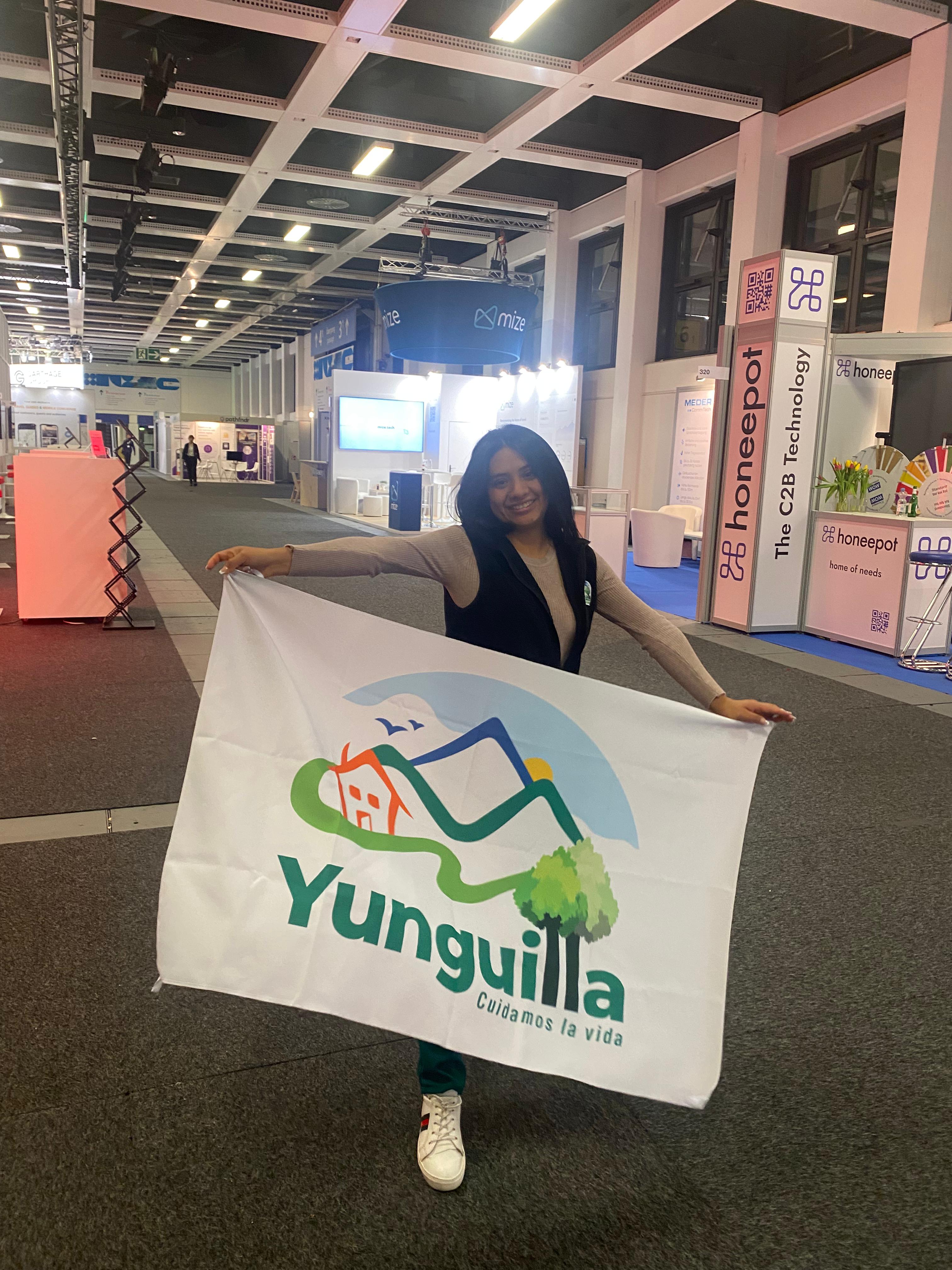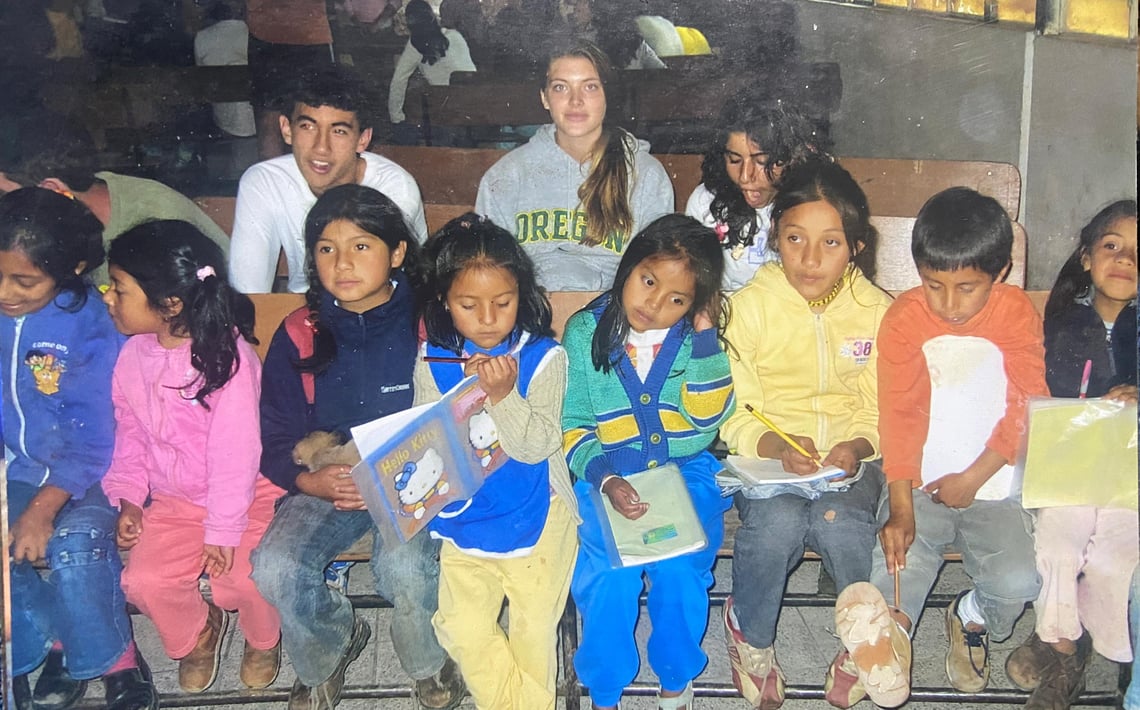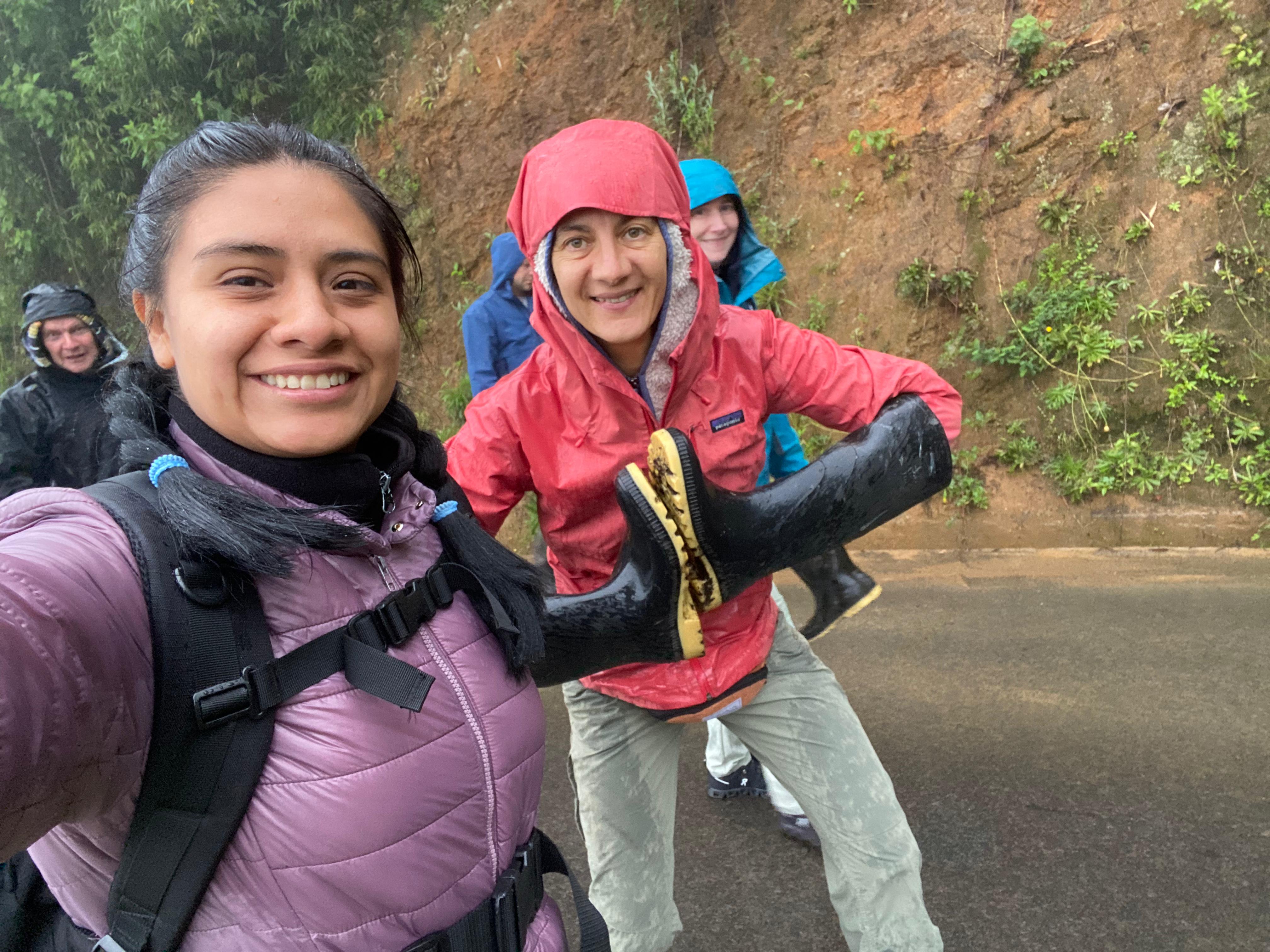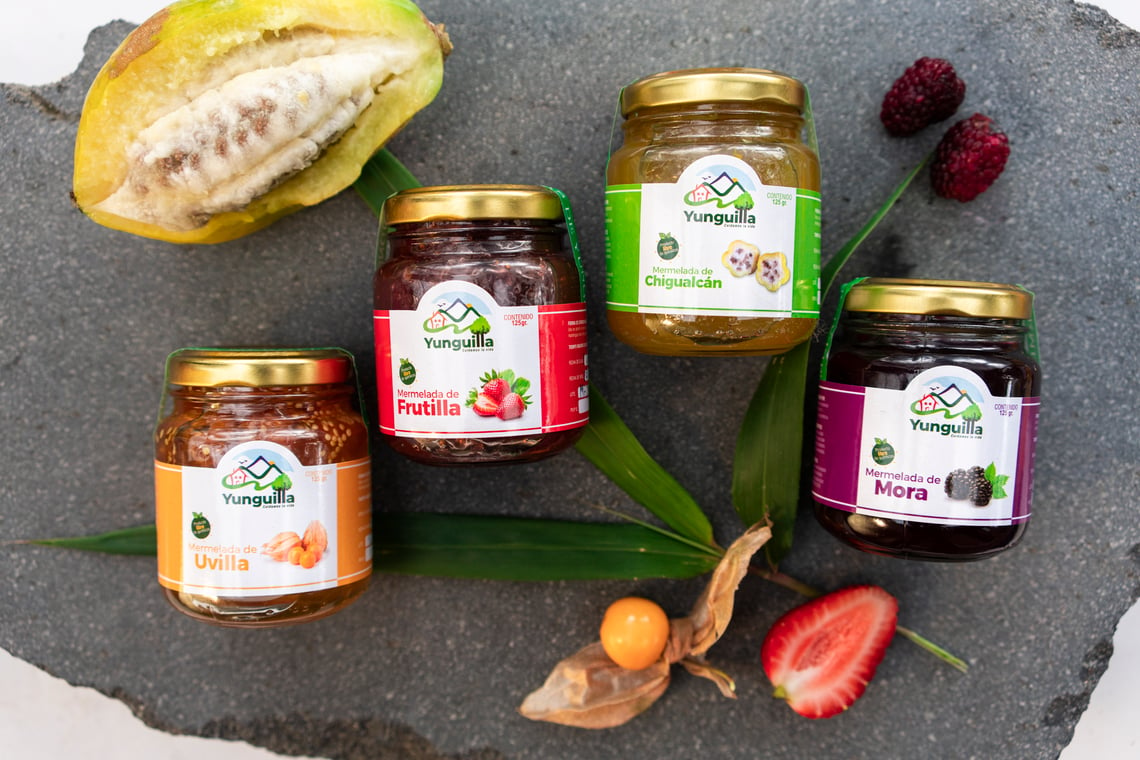Recently, V Social Foundation coordinator Marie Witzel sat down with Lizbeth Morales for a conversation about her role as a leader in her rural community. At 24 years old, Lizbeth is a model for how young people are instrumental in shaping the future of their homelands.
As a leader in Yunguilla, a village just north of Quito in the Ecuadorian Andes, Lizbeth is part of her community’s tourism efforts. Here, visitors can stay in local accommodations and enjoy traditional meals with locally produced foods at the village restaurant.

Marie: To start, can you introduce yourself.
Lizbeth: I'm Lizbeth Morales. I'm from the community of Yunguilla, located in Ecuador, in the province of Pichincha. In my community, I support the tourism area, and that's what I dedicate myself to.
Marie: Maybe you could also tell us a bit about Yunguilla and what it was like growing up in Yunguilla.
Lizbeth: I'm 24 years old. I was born and raised here all my life. What I know about my community in the past is that it wasn't organized. There was total disorder regarding agriculture, livestock, and forest resource extraction. I didn't experience that stage, but I know that all of that happened in the past.
During my lifetime, it’s been more about tourism and conservation. At school, I had environmental education classes. After that, I joined the handicrafts group, where I started collecting seeds and gathering leaves to decorate paper. And with that, I started getting involved in other activities like cooking and guiding.
The interesting thing about my community is that you can be part of all these activities. Once you enter the environmental education process, you will have the opportunity to participate in all these activities. So, as young people, obviously, we're going to explore until we find where we fit. I liked guiding. Then, I went to university and specialized in tourism management and environmental conservation. There, I found that I like management, so that's what I decided to do here.

Marie: You went to school in Quito, as well as university, right?
Lizbeth: No, we have a single-teacher school here in the community, funded by the government. For high school and university, we have to leave the community.
Marie: While studying and choosing your path, did you also have other career dreams outside of tourism?
Lizbeth: When I started studying, I was drawn to the idea of becoming an international guide. But I didn't fully understand the world of tourism at the time. When I entered this field, I loved the administrative aspect. I really enjoyed being able to meet the needs of tourists. I like asking them, "What are you looking for? What do you want?" and then trying to provide them with the best experience.
Anchoring my career here in the community was also important. I believe that education somehow makes us individualistic and think only of ourselves. You’re asking, “What do I want for my future? I have to be the owner of my own business. It has to be me.” But in Yunguilla, everything is collective. I had to learn to work in a team. And even though I grew up here, education made me forget about that. When I was in school, I was very involved in the community, went to communal work parties and all that. But when I was in university, I gradually stopped participating in these activities. So, it was a bit complex.
I've enjoyed working here so far because, in workshops like the one I'm in now and others I've participated in, I've realized that working collectively works. Sometimes, working together will help us progress faster than going alone. I really like that. I hope to pursue a master's degree on this theme of collectivity in the future.

Marie: How many young people, between 20 and 30, work in the community?
Lizbeth: Right now, we have a group of 20 young people, and 75% are doing the same thing as me. The restaurant is one of our main activities for young people to make money. From Monday to Friday, they study, and on weekends they work here in the community. When they are on vacation, they work in the restaurant and are also guides, make jams, and look for ways to contribute, but also with the goal of making money. The other option would be to go to the city, but it's not profitable because it costs money to make the trip there and back, and you're left with a minimal amount of what you earned. So, being a guide is a good option for us young people too.
Marie: You mentioned that you now work in tourism management. Could you explain a little about your tasks? What do you do on a daily basis?
Lizbeth: I work from Wednesday to Sunday. Usually, I take Mondays and Tuesdays off, but that also varies depending on how many tourists we have. On the days I work, I dedicate myself to answering emails, sending quotes, preparing packages, providing information, attending meetings, and sales. I am also support with guiding. So, when I don't have much work in the office, I'm out in the field guiding.
Marie: Perfect. Let's test the sales part. What would you say to a European tourist about what they might learn if they stay or go with a guide? What can they expect to experience?
Lizbeth: The first thing I do is ask what they are looking for to see if my product is what they want. Once they tell me yes, that they need more nature, the forest, that they want to connect with the community, I give them two options: to enter as a tourist or enter as a volunteer. As a tourist, you have more amenities, but it’s at a higher cost. As a volunteer, you don't have all the amenities, but it’s easier, at least in terms of costs. After that, I create an itinerary for them and send it to them to see if they agree. If they agree, they will be welcomed at the airport and then come here to the community. Their activities will already be prepared. I'm the one who welcomes them and gives them an introduction to what we do here. And then they work with more people from the community.
Marie: Could you explain how tourism fits into Yunguilla's vision?
Lizbeth: You know, tourism is one of the main economic activities, but it's not the only one. Going through the pandemic, we realized that relying solely on tourism doesn't work. However, it’s still fundamental for us because, without tourists, we don't really have a way to market our products. They come to the community and buy our jams and cheeses. So, tourism has created a lot of employment opportunities here with families. It's true that not everyone can be a guide, but we've decided that one family will focus on providing accommodation, another will provide food, and so on.
Tourism has also helped us a lot in terms of development. I could say that having this mix of cultures has helped us see beyond. In the countryside, we sometimes feel closed off or more private, but meeting new cultures has also helped us understand. I can give you a very clear example of the issue of equality. Here in Ecuador, there are many cultures where machismo is still prevalent, and getting to know other cultures has helped us here. We learned that, as women, we don't necessarily have to be just cooking or taking care of children at home, but can educate ourselves, maybe find passion in our work. So, I think that's very nice. Because many young women nowadays are not becoming mothers anymore. In South America, the pressure to become a mother at a very young age is very strong. And in my community, that used to happen a lot, but now hardly any girls from my generation have children. That's positive.
.png?width=1140&height=665&name=VSF_%20Yunguilla%20interview%20(5).png)
Marie: Do you have any dreams for Yunguilla or for the future of Yunguilla that you would like to share?
Lizbeth: Yeah, I have a lot of dreams. Look, Yunguilla already has many things. But I believe we need to strengthen several of these. Tourism even for the national market is already within reach, which is what worried us the most. We spent a lot of time only working with foreign groups, but now, even during the week, we sometimes get domestic tourists. When I see that, I think, yes, why couldn't Yunguilla create its own tour operator, its own agency? That would be great because it would generate more jobs. I would love that.

I would like to someday export some of our products. That I would really like. Because tourism alone can't guarantee our livelihood all the time. The pandemic made us realize that even tourism shuts doors for many people. Many women were cooking and guiding, and when that closed down, there was no more work. Many of us got used to receiving tourists in our homes, and agriculture kind of fell by the wayside. We need to strengthen this. It doesn’t have to be mass agriculture, but small scale. What's already being done, but a little stronger. Now, it’s only our grandparents involved in agriculture. I think that's a problem for our whole country that we still don't know how to combat, how our farmers are disappearing. Because now all the young people go away to study, they come back with degrees, but who takes up a shovel, takes a machete, and goes back to the field?
That's why I'm happy about these workshops, these organizations. Because they are showing us or teaching us, rather, how to recover from that. Now there's technology that's perhaps not so harmful to the land. It has worked for us. A few months ago, as young people, we managed to organize a minga.
We've always participated, but never managed to organize one ourselves. And I swear, it was really beautiful. Seeing classmates who usually sit in front of a computer doing homework with a shovel, seeing them with a machete, was very interesting.
Marie: What did you do in this minga?
Lizbeth: Now we have a project working with nurseries, greenhouses. So that we can produce something. We’re understanding what we as young people can do to help the business. The first step was to set up these greenhouses. We had to clear the land. That's why we had shovels and machetes. We realized we needed a tiller. So, as young people, we managed to buy this tiller. And that's going to help us a lot. I think what's coming is going to be interesting.
.jpg?width=1140&height=855&name=WhatsApp%20Image%202024-04-17%20at%2022.39.40%20(2).jpg)


.png?width=1140&height=665&name=VSF_%20Yunguilla%20interview%20(4).png)



